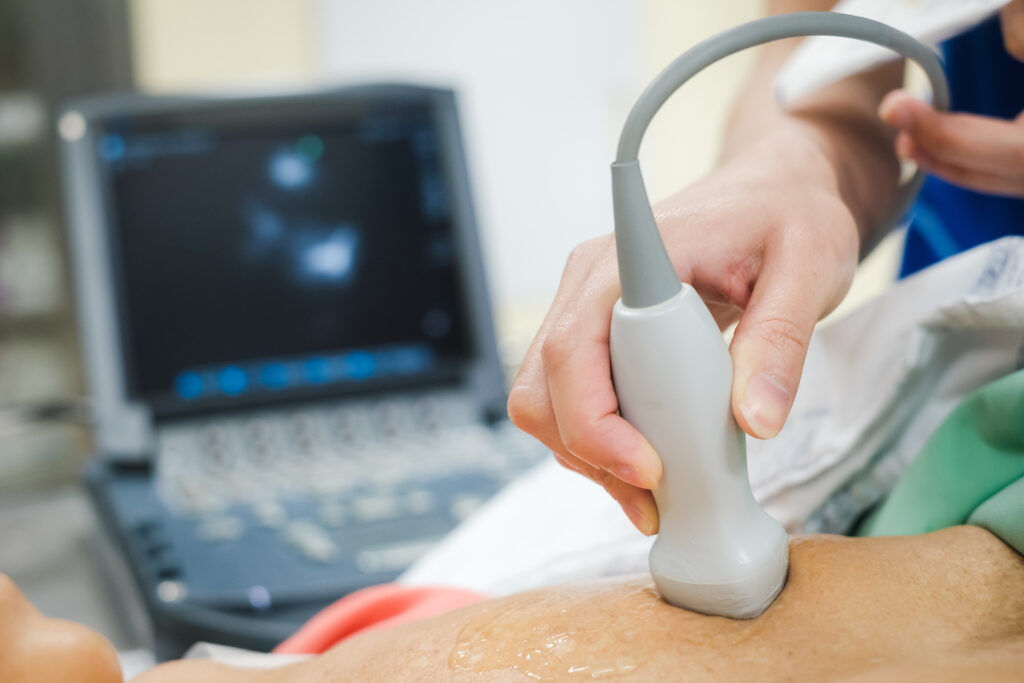Why did my healthcare provider recommend a low-dose lung CT screening for cancer?
If your healthcare provider recommends a low-dose lung CT screening, it means your medical history might put you at a higher risk for…

Gateway Diagnostic Imaging offers high-quality ultrasound services in the Dallas-Fort Worth area, providing you with affordable and accurate imaging.

An ultrasound uses sound waves to create an image of your organs, tissues, and other structures inside your body.
While many people are familiar with pregnancy ultrasounds, you can also get an ultrasound to diagnose or assess many conditions, including gallbladder disease, thyroid issues, joint inflammation, and blood flow issues.
Ultrasounds are non-invasive, painless, and don’t use any radiation so they’re a safe option for people who may be sensitive to radiation.

Our imaging centers in Dallas-Fort Worth and Abilene provide a comprehensive array of ultrasound services, including:

Ultrasounds are designed to be quick and comfortable. Here’s a brief overview of what to expect.
Preparing for your ultrasound: Your healthcare provider will give you specific instructions to follow. For certain scans, like abdominal ultrasounds, you may need to fast. Be sure to check with your healthcare provider, first.
What happens during an ultrasound: First, a sonographer will apply a water-based gel to your skin, which helps the sound waves travel through your skin and into your body. Then, the sonographer will move a small, handheld device over your skin. This device, called a transducer, sends sound waves into your body and then catches the waves as they bounce back. This data is sent to a computer, which turns the sound waves into images.
How long does an ultrasound take: Most ultrasounds take 30-60 minutes to complete, depending on your circumstances, and on the scan your provider orders.
Once your scan is finished, your ultrasound report will be available within a few days, and your healthcare provider will contact you to discuss your results.

We think accessibility and convenience are important, so we can ensure you’ll be able to get the ultrasound you need, at a price you can afford:
Gateway Diagnostic Imaging is proud to be accredited by the Intersocietal Accreditation Commission (IAC), which recognizes our commitment to excellence in diagnostic imaging, and adherence to nationally recognized standards for quality, safety, and patient care.
Getting ready for an ultrasound is pretty simple. Here’s what you can do:
Ultrasound appointments typically last 30-60 minutes from the time you check in for your appointment until you leave our center depending on the area being imaged.
Yes! An ultrasound are non-invasive imaging technique that uses sound waves to produce images of the body. A technician will place the handheld probe/wand on the area of the body being imaged. Sound waves pass through the body and bounce off of internal structures back to the wand. A computer than translates these echoes into images that can be viewed on the ultrasound screen.
Ultrasound is a versatile imaging technique that can provide detailed pictures of various parts of the body. Here’s what can typically be seen on an ultrasound:
It’s important to note that while ultrasound is a valuable tool for imaging, it may not provide as detailed images as other techniques like CT or MRI. Always discuss the results and implications of the ultrasound with your healthcare provider.
Doppler ultrasound is like a special kind of ultrasound that helps us see and hear the flow of blood in our body. We are able to see how your blood is moving through your body and check if everything is working well. Here’s how it works:
Yes, ultrasound imaging is typically covered by health insurance when a healthcare provider has requested the exam.
Ultrasound imaging is a commonly performed imaging technique. The cost for the exam depends on your insurance coverage and area of the body being imaged. Gateway Diagnostic Imaging provides affordable ultrasound services at 12 locations throughout the greater Dallas-Fort Worth area.
Yes, we offer OB ultrasounds during the 1st trimester.
It depends on the area we will be looking at with the ultrasound. Your provider might need you to fast for 8-12 hours before your ultrasound. Depending on the imaging need, having a full bladder or stomach can sometimes cause blurry images. You can still take your daily medications with water, as necessary. We recommend consulting with your center location before your appointment. Read more about how to prepare for your abdominal ultrasound.
Ultrasounds involve using sound waves to create images of the inside of the body, and the process is painless. Many people find ultrasounds to be quite comfortable, as they typically involve the application of a warm gel to the skin and the gentle movement of a transducer over the area being examined. If the part of your body being imaged is sore, you may experience mild discomfort. For transvaginal ultrasounds, the process is a bit different as the transducer may be inserted into the vagina. Read more about what to know about transvaginal ultrasounds.
No, it is not necessary to remove hair around the body prior to an ultrasound. Be careful not to apply excessive lotion, oil, perfume, or powder to the area being imaged.
Go for something comfy and loose-fitting. You may be asked to change into a gown for your ultrasound depending on the body part being imaged.
This depends on the part of your body being examined. We recommend consulting with your imaging center for specific instructions about fasting. The presence of food in your stomach can affect how the ultrasound waves travel through your body, especially if we are imaging the abdominal area.
A radiologist will first examine and write a report about your ultrasound images for your doctor. Your provider will review the results and let you know the next steps.
During your appointment your tech will apply a small amount of gel to the area of interest for the ultrasound. This gel is necessary because it transfers the ultrasound waves between your skin and the transducer. It also helps aid the gentle movement of the transducer. The gel is non-irritating to the skin and will be cleaned off after the ultrasound. If you have a specific skin allergy you are concerned about, please let your ultrasound technician know.
If your healthcare provider recommends a low-dose lung CT screening, it means your medical history might put you at a higher risk for…
When your healthcare provider orders a brain MRI scan, it means they want to take a close look at detailed images of your…
A chest CT scan provides your doctor with detailed images of the organs and structures inside your chest. On your chest CT results,…

